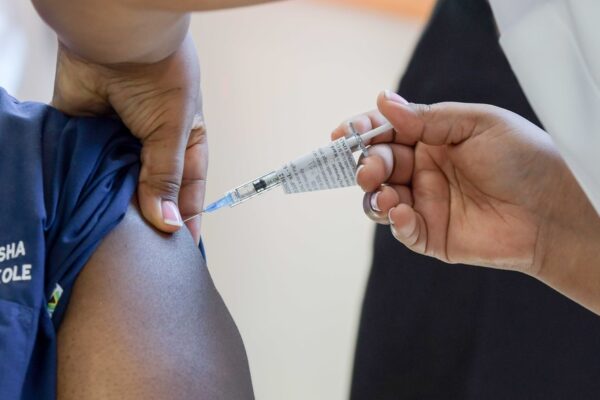As the COVID-19 pandemic continues with the Delta variant sweeping across the globe, the need for a timely and coordinated vaccine response is urgent. Faith communities and their leaders are an important vanguard in the effort to defeat COVID-19.
The pandemic has cost more than 4.2 million lives and has left many people with long-term, debilitating health problems. COVID-19 has also laid bare the systemic inequities in access to healthcare and medicines in a stark and unforgiving fashion. Vulnerable and marginalized communities—whether in Los Angeles, rural Uganda or the slums of Mumbai—have suffered disproportionately from the disease.
Faith institutions are the backbone of many low- to moderate-income communities around the globe, providing both essential services and a voice of morality, peace and reason.
At the root of all faith traditions is an established value of life.
The moral imperative to value life is the catalyst for many faith communities to engage in vaccination awareness, advocacy and creating accessibility through testing and vaccine sites at houses of worship. Many faith leaders see their role not as political, but as prophetic. They uphold this value around life, so their communities can thrive.
What can members of faith communities and their leaders do to engage in the larger public conversation around vaccine efforts and ensure that vulnerable populations have access to vaccines, medical supplies and appropriate information?
Here are five ways that your faith community can make a difference today and contribute directly to COVID-19 vaccine advocacy and direct service efforts:
1. Fundraise and donate.
Give financial support to reputable organizations that are purchasing and distributing vaccines and medical supplies around the world. The COVID-19 Vaccines Global Access initiative, or COVAX, is leading global efforts to get the vaccines equitably distributed beyond North America and Europe. Although countries have contributed funds, and some have shared their vaccine stock, there is a great need to rapidly increase the quantity and availability of these vaccines in Africa, Asia and Latin America.
Some reputable organizations working toward purchasing and distributing the vaccine and who have extensive experience working with national governments and getting vaccines “the last mile” are:
Low-income countries are also in desperate need of medical supplies such as respirators, oxygen concentrators and personal protective equipment (PPE). Organizations such as DirectRelief International are experienced in humanitarian assistance and the distribution of medical supplies around the globe.
2. Host a vaccine site at your house of worship.
Contact your local county or district Department of Public Health and volunteer your parking lot or other physical structure to host a pop-up vaccine clinic. Advertise the clinic through your networks and local community organizations and businesses.
3. Raise awareness.
Religious leaders are influential and trusted sources in a media environment rife with misinformation, conspiracy theories and medical quackery. Partner with government public health agencies, medical institutions, nonprofits and research centers to host virtual community information events, distribute pamphlets or other resources in your local community (e.g., houses of worship, community development centers, barbershops, hairdressers, etc.) to provide health and safety information on COVID-19 and combat misinformation.
Post evidence-based information on your house of worship’s website or social media platforms. Public health agencies and other organizations have social media and information resources that you can use freely. CRCC’s post on reopening houses of worship shares toolkits for messaging around vaccines as well as links to how people can find vaccines.
Additional reputable websites that you could link to include:
- U.S. Centers for Disease Control (CDC)
- The CDC also has an easy-to-read resource section on COVID-19 and vaccines.
- World Health Organization
- Los Angeles County Department of Public Health
- Interfaith Youth Corps Outreach Guides and Resources
- Immunization Action Coalition’s Religious Concerns Resources
4. Advocate.
Email, call or send a letter to your congressional representative and senators to advocate for more funding and equitable sharing of vaccines and medical supplies to lower income countries whose fragile healthcare systems are buckling under the weight of the pandemic:
- Find your congressional representative tool
- How to contact U.S. Senators
- Senators’ telephone numbers
Example script for your email or letter:
Dear Senator/Congressman or Congresswoman,
I’m writing to ask you to support and advocate for an accelerated timeline and resources (COVID-19 vaccines and medical supplies) to be contributed to COVAX, UNICEF and other international health initiatives to address inequitable access to life-saving vaccines and supplies in lower income countries. As a member of the [insert faith community], I believe in supporting all people, regardless of socioeconomic status, faith or geographic location, to live healthy lives and contribute to their families and communities.
Sincerely,
[insert your name]
5. Tap into your faith community resources.
Develop a group of members that share an interest in supporting local and international efforts to combat COVID-19. The biggest resource that faith communities have is their membership. Identify members within your own house of worship and across your faith community—such as medical or public health professionals, teachers and local business owners—who have strong networks and a vested interest in contributing to efforts against COVID-19. Use these resources to educate, fundraise and advocate for equitable access to vaccines, fight misinformation, and ensure that your faith community’s voices are heard and their concerns are addressed. Have a member of this group host a webinar or other faith-appropriate event that creates a safe space for members to discuss information on COVID-19, vaccines and the challenges they are facing (financially, mentally, physically) during this pandemic.
These five areas are not an exhaustive list but are intended to kickstart discussion on what you and your faith community can do in a practical way to fight COVID-19 and effect change locally and abroad.
Photo Credit: Jeffrey Abrahams/GroundUp (CC BY-ND 4.0)
Tarra McNally is an affiliate with the USC Center for Religion and Civic Culture.





